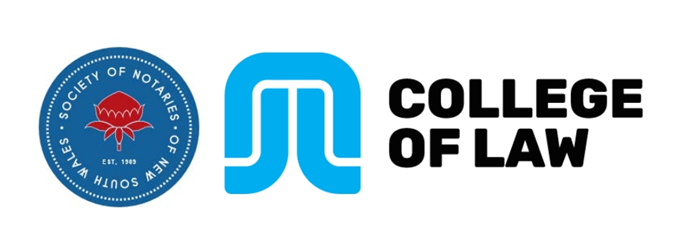
NOTARIAL PRACTICE TRAINING COURSE
- Become a Notary Public
- Live in-person
- 19 CPD units
- Certificate of completion
OVERVIEW
The College of Law in conjunction with our teaching partners, the Society of Notaries of New South Wales, is authorised to conduct training for barristers or solicitors of not fewer than five (5) years standing, who wish to apply for appointment as a Public Notary under the Public Notaries Act 1997 (NSW). Successful completion of this course will enable you to apply to the Legal Profession Admissions Board (LPAB) for appointment by the Supreme Court of NSW as a Public Notary.
This course is currently the only notarial practice course in New South Wales that is approved by the NSW Legal Profession Admission Board.
For more information about the role of a Notary Public and eligibility to be appointed as one, please refer to the Guide for Public Notaries v2 and to the Society of Notaries of NSW website.

COURSE STRUCTURE
The course will be conducted by members of the Society of Notaries of NSW, including:
- Mr Charles Appleton, Vice-President, The Society of Notaries NSW
- Mr Colin Dunston, Secretary and Treasurer, The Society of Notaries NSW
- Mr Justin Betar, Council member and past President, The Society of Notaries of NSW
- Mr Peter Snelgrove, Council member and past President, The Society of Notaries NSW
Please note that the examination is challenging and is set at the level necessary to ensure that newly appointed notaries are sufficiently competent to meet the challenges of practice.
The Notarial Practice Training Course is typically held in May and September. Due to high demand and limited places, we encourage early registration.
To be added to the waitlist for future intakes, please register your interest by sending an enquiry to cpd@collaw.edu.au.
Are you an existing Notary Public? Enhance your skills and stay updated with the latest developments in notarial practice through our one-day masterclass, offered only once a year.
Led by Mr Charles Appleton, Vice-President, The Society of Notaries NSW, and featuring esteemed guest speakers, including past presidents and Councillors of the Society, this masterclass offers a comprehensive refresher in notarial practice.
We recommend registering your interest by sending an enquiry to cpd@collaw.edu.au and stay tuned for upcoming course dates. Don't miss this annual opportunity to advance your notarial expertise!
The course is comprised of a three-day face-to-face training component, followed by a take-home examination assessment, and will cover:
- Authenticating official, government and personal documents and information for use overseas.
- Witnessing signatures of individuals to documents and authenticating identity for use overseas.
- Witnessing Powers of Attorney for use overseas, including from time to time, preparing them.
- Certifying true copies of documents for use overseas.
- For corporations and business -witnessing documents and authenticating status and transactions for use overseas.
- Dealing with documentation for land, property and deceased estates overseas.
REGISTER YOUR INTEREST
Send an enquiry today and take the next step towards becoming a certified Notary.
FAQs
The course is open to barristers or solicitors who have been in practice for a minimum of five years and meet the eligibility criteria set by the Legal Profession Admissions Board (LPAB).
Yes, all candidates must attend a live Notarial Practice Information session (either in person or online). The session, approximately 1.5 hours in duration, is usually held in February each year. The Customer and Student Engagement (CSE) team will contact the eligible candidates on the waitlist (according to priority on the waitlist) to advise of the date and time of the next Information Session. If you are unable to attend the session, you will need to contact the CSE team at cpd@collaw.edu.au, to discuss your options.
The course is scheduled to run in May and September. Due to high demand and limited places, early registration is encouraged.
To be added to the waiting list for future intakes, please register your interest in sending an enquiry to cpd@collaw.edu.au
Yes, however, please be aware that Section 11 of the Public Notaries Act 1997 (NSW) restricts public notaries who are not part of a law practice (for example, in-house counsel) from performing notarial work for their employer or a client of their employer.
This course is recommended for private practice practitioners.
Please read the Legal Profession Admission Board’s ‘Guide for Applicants for Appointment as a Public Notary,’ which is available here.
If you have any doubts about your eligibility for appointment as a Notary, please contact the Legal Profession Admission Board (LPAB) before enrolling in the course.
For detailed information about the recommended fees for performing notarial work, please visit the Society of Notaries website here.
To successfully complete the course and be eligible to apply for appointment as a Notary, participants must:
- Attend and participate in all sessions of the training course
- Achieve a grade of 75% in each section of the take-home examination
